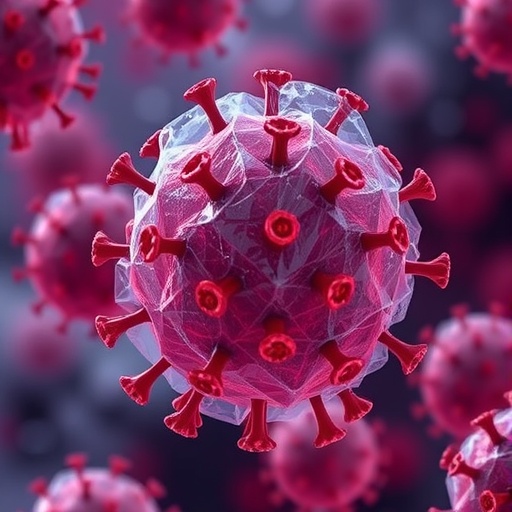In the landscape of neurological disorders, Parkinson’s disease (PD) has long been a subject of intense research, with its complex etiology and multifaceted pathology challenging scientists worldwide. The emergence of the COVID-19 pandemic inadvertently opened unforeseen investigative pathways, revealing intricate connections between stress, systemic inflammation, and neurodegeneration. A recent groundbreaking study published in npj Parkinson’s Disease by van der Heide and colleagues delves into this tripartite interaction, shedding new light on how the stress and inflammatory responses elicited during the pandemic may influence Parkinson’s disease progression and pathology.
At the heart of Parkinson’s disease lies the progressive degeneration of dopaminergic neurons in the substantia nigra, leading to hallmark motor dysfunctions such as tremors, rigidity, and bradykinesia. However, the pathogenic mechanisms underpinning neuronal loss remain shrouded in complexity, with increasing evidence implicating neuroinflammation and systemic stress responses as critical modulators. The COVID-19 pandemic, a period characterized by heightened psychosocial stress and immune activation, thus offers a unique human model to probe these influences within a real-world context.
Van der Heide et al. meticulously analyze how the physiological stress induced by the pandemic, both psychological and biological, may exacerbate inflammatory cascades implicated in PD pathogenesis. The study synthesizes epidemiological data, molecular mechanisms, and clinical observations, emphasizing the bidirectional communication between the central nervous system and immune system—a crosstalk intensified under pandemic stress. Elevated proinflammatory cytokines, such as interleukin-6 (IL-6) and tumor necrosis factor-alpha (TNF-α), noted in COVID-19 infection and chronic stress states, have been shown to not only permeate the blood-brain barrier but also activate microglial cells, potentiating neuroinflammation.
This neuroinflammatory milieu precipitates a vicious cycle, wherein activated microglia release reactive oxygen species and inflammatory mediators that accelerate dopaminergic neuron death. The authors highlight that stress-induced hypothalamic-pituitary-adrenal (HPA) axis dysregulation during the pandemic leads to aberrant glucocorticoid signaling, further compounding inflammatory processes. Chronic elevated cortisol levels, associated with stress, may impair neuronal resilience by modulating synaptic plasticity and mitochondrial function, critical factors in PD progression.
Importantly, the study underscores clinical data gathered during the pandemic period, revealing an observable exacerbation of motor and non-motor symptoms among PD patients. Increased psychological distress, isolation, and reduced access to therapeutic interventions compounded disease burden, demonstrating that environmental stressors can tangibly influence disease trajectory. The authors propose that COVID-19-related systemic inflammation and stress responses may have precipitated or accelerated neurodegenerative processes in susceptible individuals.
Beyond the clinical observations, van der Heide et al. delve into molecular insights by discussing the role of key inflammation mediators during viral infections and stress. Notably, the activation of nuclear factor-kappa B (NF-κB) signaling pathways in neuronal and glial cells is pivotal in mediating inflammatory gene expression during both COVID-19 infection and PD. This convergence prompts a reevaluation of therapeutic strategies targeting inflammation, suggesting that modulating NF-κB or downstream effectors may offer dual benefits in managing PD progression aggravated by systemic insults.
The interplay between neuroinflammation and α-synuclein pathology also features prominently in the study. Stress and inflammatory cytokines are proposed to influence α-synuclein aggregation—a central pathological hallmark of PD—by altering protein homeostasis and promoting misfolding. This abnormal protein accumulation subsequently activates immune responses, creating an inflammatory feedback loop detrimental to neuronal health. Such findings position inflammation as both a cause and consequence of α-synuclein pathology, intensifying the neurodegenerative cascade.
In exploring therapeutic implications, the authors advocate for integrative approaches addressing both neuroinflammation and stress management in PD care, particularly in post-pandemic healthcare paradigms. Pharmacological agents with anti-inflammatory properties, alongside interventions aimed at normalizing HPA axis function, may provide synergistic benefits. The paper also highlights the potential of lifestyle modifications, including stress reduction techniques and exercise, as adjunctive therapies to mitigate inflammation-driven neurodegeneration.
Furthermore, van der Heide et al. emphasize the need for enhanced patient monitoring during periods of heightened psychosocial stress, such as pandemics, to prevent exacerbation of PD symptoms. Telemedicine and digital health tools have emerged as valuable platforms during COVID-19, and their continual integration into neurodegenerative disease management could improve outcomes by facilitating timely interventions and psychological support.
The study identifies gaps in current knowledge, calling for longitudinal research to unravel causative links between acute viral infections, chronic stress exposure, and PD progression. Experimental models replicating the combined effects of systemic inflammation and psychological stress on dopaminergic neurons are imperative to validate hypotheses generated from clinical data. Such models will also be instrumental in screening novel therapeutics that target the neuroimmune axis in Parkinson’s disease.
Additionally, the authors consider genetic susceptibilities that may modulate individual responses to stress and inflammatory insults. Variations in genes encoding cytokines, glucocorticoid receptors, and proteins involved in α-synuclein metabolism could explain heterogeneity in PD progression and stress resilience, emphasizing personalized medicine approaches in future research and therapy.
This comprehensive investigation by van der Heide and colleagues not only elucidates the multifactorial interplay between stress, inflammation, and Parkinson’s disease but also contextualizes these findings within the unprecedented global health crisis of the COVID-19 pandemic. It challenges the scientific community to reconceptualize neurodegeneration through a holistic lens that incorporates environmental and systemic factors, heralding a paradigm shift in understanding and managing Parkinson’s disease.
In conclusion, the pandemic has inadvertently functioned as a natural experiment revealing how pervasive stress and inflammation synergize to influence neurodegenerative diseases. The insights garnered from this study underscore the urgency for interdisciplinary collaborations that integrate neuroscience, immunology, endocrinology, and psychiatry to formulate comprehensive strategies against Parkinson’s disease. As the world emerges from the pandemic’s shadow, such integrative research paves the way for innovative therapies that not only target neuronal pathology but also modulate systemic contributors to disease progression.
Subject of Research: The study explores the interactions between stress, systemic inflammation, and Parkinson’s disease, particularly illuminated by observations during the COVID-19 pandemic.
Article Title: The interplay between stress, inflammation and Parkinson’s disease: insights from the COVID-19 pandemic.
Article References:
van der Heide, A., Kischkel, B., Rovers, C.P., et al. The interplay between stress, inflammation and Parkinson’s disease: insights from the COVID-19 pandemic. npj Parkinsons Dis. 11, 333 (2025). https://doi.org/10.1038/s41531-025-01178-7
Image Credits: AI Generated
DOI: https://doi.org/10.1038/s41531-025-01178-7




